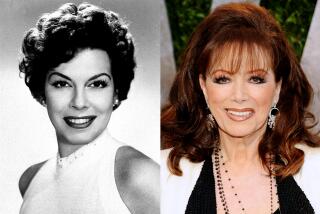BOOK REVIEW : Breaking Into Dickens’ Code of Silence : THE INVISIBLE WOMAN: The Story of Nelly Ternan and Charles Dickens, <i> by Claire Tomalin,</i> Alfred A. Knopf, $25, 268 pages
You shouldn’t read some books when you’re melancholy, and “The Invisible Woman”--despite its obvious and sterling merits--is one of those books. The subject of this biography is Nelly Ternan, who, at least since Ada Nisbet’s short and stunning “Dickens and Ellen Ternan” written in 1952, has been known to have been Dickens’ mistress for the last 13 years of his life.
Ada Nisbet’s discovery of the great man’s coded message to Nelly--about whether she should accompany him on a literary tour to America--was recounted to all of us in graduate school as an exemplum of a certain kind of knowledge: Turn every last page of every little notebook, because it was only in the last pages of one little lost diary that this “incriminating” information turned up.
This scholarly pursuit of knowledge seems somehow correct and reassuring. Work hard, read books, keep your eyes open, do your homework, and the truth (whatever it is) shall be revealed to you. But reading Claire Tomalin’s longer, sadder, weirder and more ambiguous biography of Nelly Ternan presents another view of perceived reality.
When Charles Dickens was 47, at the height of his powers, father of nine living children, champion of hearth and home, author of “The Christmas Carol” and generally the most popular author in England, he became smitten with Nelly Ternan, one of three acting sisters in a fairly well-known theatrical family. Dickens unceremoniously gave his wife, Katherine, the boot, kept all his children to himself, and co-opted Katherine’s own sister Georgina to become housekeeper and surrogate mother to all those kids. He told everyone who would listen that his wife was crazy and that this domestic change had nothing whatsoever to do with the good, pure girl he just happened to have met.
People believed all that. Except when they didn’t. Spiteful open-eyed women wrote in their commonplace books that they saw a “strutting” Dickens with a woman “not his wife.” Sympathetic men friends remarked to each other that Dickens was “half-mad” with his own domestic situation. Acquaintances wrote to each other in letters that if this is what you could expect from a champion of hearth and home, they’d hate to see what a rake might do in the same circumstances.
Nelly Ternan lived alone (or sometimes with her mother) in a London suburb and maintained a “respectable” life. She was 18 when she became Dickens’ mistress (some people still doubt she was his mistress) and 31 when he died.
Her life went from an arduous gypsy childhood to domestic dullness as she waited around in her lonely house for the great man to show up. There is some evidence that she made his life hard; that she was cold to his physical advances, that she made him obscurely ashamed of himself. (Meanwhile, as his sons turned 15 or 16, Dickens shipped them off to war--or to Australia.)
Dickens died. Whether Nelly was his mistress or not, his family sent for her to be by his deathbed. Nelly’s two sisters had married by this time and left the disreputable acting profession. One was bored to death in her respectable connection to an Oxford brewer. The other lived in Florence married to a hearty journalist.
After Dickens died, Nelly took a page from her mentor’s book, so to say. She went into the bare-faced-lie business, declared herself a respectable virgin 12 years younger than she was, married a gullible Oxford undergraduate, had a son, Jeoffrey, and a daughter, Gladys--though there were rumors of other, earlier children, who may or may not have died, by Dickens.
The whole point of secrets is that people want them kept. The “truth” is always there, in gossip, rumor, stories, letters, the one lost diary that survives out of mountains of destroyed documents. There came a day after his mother’s death, when Jeoffrey, grown up, went to visit one of Charles Dickens’ sons and asked him if Nelly, his own mother, had been the great man’s mistress. Evidently, the son said, “Sure!” Jeoffrey went home and burned his mother’s mementos--everything.
The Ternan sisters, their cunning and their courage, are a scary inspiration. Katherine Dickens’ “quiet dignity” seems mighty close to martyrdom in these days. Dickens’ own frantic lying and posturing and scheduling make you desperately sorry for the guy. He spent his whole life on a train, going back and forth from one life to another. The futilities of all our lies and fictions blast through this narrative with strobe-light intensity. That’s why you should read this when you’re strong, not melancholy.
Next: John Wilkes reviews “Dinosaurs, Spitfires, and Sea Dragons” by Christopher McGowan (Harvard University Press).
More to Read
Sign up for our Book Club newsletter
Get the latest news, events and more from the Los Angeles Times Book Club, and help us get L.A. reading and talking.
You may occasionally receive promotional content from the Los Angeles Times.






